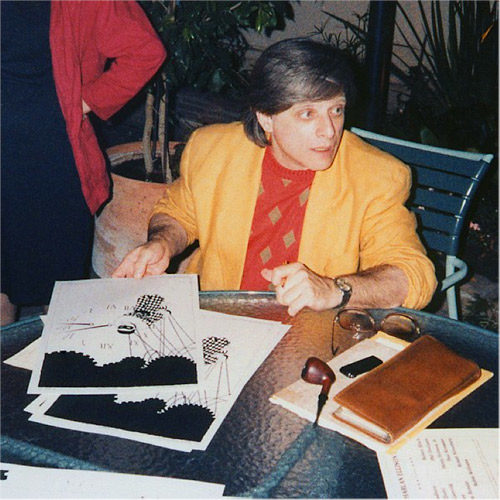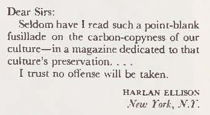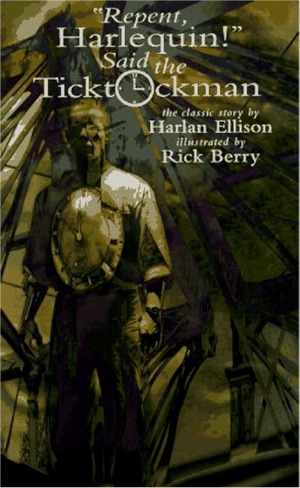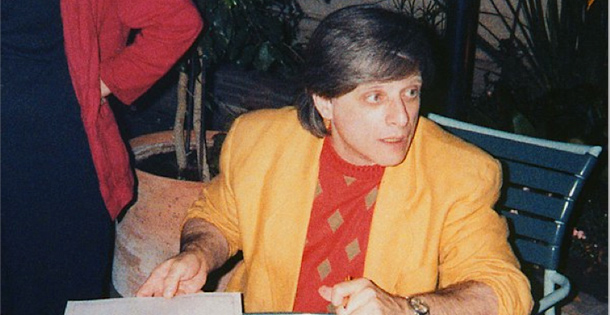
How do you memorialize genius? When you’re confronted with the indisputable evidence that a creative mind left behind more than 1,700 short stories, screenplays, novellas, television scripts, comic book scripts, essays and articles, where do you begin? Perhaps you take the author’s own advice from the introduction of his short story, “Night Vigil”, which is “DO THE DAMNED JOB. Just do it.” In that case, you simply begin with fact that Harlan Ellison died on Thursday. He was 84.
A staggeringly influential and award-winning writer, Ellison cultivated a legion of fans for his ability to slip effortlessly between genres and formats, his ability to dissect the culture, and his hard-nosed persona. His worked challenged social norms and ills while asking larger questions about existence. He did not shy away from harsh reality, and had no qualms about shocking the reader. Despite his well-earned reputation for being combative, Ellison’s friends frequently noted his generosity, with many writers posting on social media after his passing about various times when Ellison would call to check in on a sick child or to express condolences upon a familial loss.
Born in Cleveland in 1934, Ellison broke into writing with two short stories published in the Cleveland News in 1949, The Gloconda and The Sword of Parmagon. He moved to New York in 1955, pursuing his writing career. In two years, he published more than 100 stories before serving in the U.S. Army from 1957 to 1959.

After his service, Ellison leaned fully into the writing and constant motion that would mark his life. It’s frankly impossible to list his work and activities. It’s a challenge to even list the highlights. He participated in the Selma marches led by Martin Luther King, Jr. He worked for Disney for one day but was fired for inappropriate jokes. He wrote for a number of classic television series, including The Twilight Zone, The Outer Limits, and Star Trek; his screenplay for the Trek episode “The City on the Edge of Forever” earned a Writer’s Guild of America Award and a Hugo Award after it aired in 1967 (The full episode of “The City on the Edge of Forever” is available for viewing at StarTrek.com).
A number of Ellison’s works have been adapted for other media. The novella A Boy and His Dog was filmed in 1975. Dark Horse Comics ran a series called Harlan Ellison’s Dream Corridor featuring popular comic writers and artists interpreting various works, with collections printed in 1996 and 2007.

It is perhaps his robust collection of short fiction for which he is best known. Though Ellison resisted the easy categorization of being called a “science-fiction writer”, he nevertheless made a major impact on science-fiction, fantasy, horror, crime, and more with his easy transitions and combinations of subject matter. Ellison adapted “Soldier From Tomorrow” into the “Soldier” episode of The Outer Limits, and later successfully sued James Cameron for uncredited similarities to The Terminator; those films now carry a creator credit for Ellison. “Repent, Harlequin! Said The Ticktockman” won a Hugo Award, a Nebula Award, and is acknowledged as one of the most reprinted short stories in the English language.
Other writers frequently point to Ellison as both inspiration and mentor. In his non-fiction treatise on horror, Danse Macabre, Stephen King devoted considerable space to Ellison, mining many quotes from their correspondence and friendship. When King asked Ellison to describe himself and his work, Ellison’s lengthy answer finished with, “From time to time some denigrater or critic with umbrage will say of my work, ‘He only wrote that to shock.’ I smile and nod. Precisely.”
Ellison married his fifth wife, Susan, in 1986, and they remained together until his passing. At her request on Thursday, a statement announcing Ellison’s death was released. The statement included a final quote from Ellison. It read, “For a brief time I was here, and for a brief time, I mattered.”
Become a Saturday Evening Post member and enjoy unlimited access. Subscribe now




Comments
The Gay Talese classic article in Esquire, “Frank Sinatra has a cold,” contains a priceless vignette in which Sinatra tries to pick a fight with Ellison in a Sunset Strip club.
The Gay Talese profile of Frank Sinatra, “Frank Sinatra has a cold,” which was originally published in Esquire in the mid Sixties, has a priceless vignette about Sinatra’s tryring to pick a fight with Ellison in a club on the Sunset Strip.
His was a singular voice. He will be missed.
Thank you, sir.